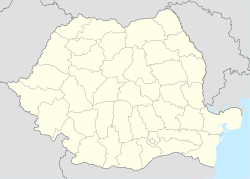Certiae (castra)
Appearance
| Certiae | |
|---|---|
| Alternative name(s) | Cersie, Certie,[1] Certia [2] |
| Known also as | Castra of Romita, Castra of Brusturi |
| Founded during the reign of | Trajan |
| Founded | 2nd century AD |
| Attested by | Tabula Peutingeriana |
| Place in the Roman world | |
| Province | Dacia |
| Administrative unit | Dacia Porolissensis |
| Administrative unit | Dacia Superior |
| Limes | Porolissensis |
| Directly connected to | Largiana |
| Structure | |
| — Stone structure — | |
| Size and area | 187 m × 225 m (4.2 [3] ha) |
| Stationed military units | |
| — Cohorts — | |
| Location | |
| Coordinates | 47°09′14″N 23°12′58″E / 47.1539°N 23.2160°E |
| Town | Romita |
| County | Sălaj |
| Country | |
| Reference | |
| RO-LMI | SJ-I-s-A-04859 |
| RO-RAN | 140716.01 |
| Site notes | |
| Recognition | |
| Condition | Ruined |
| Exhibitions | County Museum of History and Art, Zalău |
Certiae was a fort in the Roman province of Dacia. The ruins are located near the villages of Romita and Brusturi, and the fort is also called the Castra of Brusturi. It is likely that the castra was the first fortification built in the region, during the conquest of Dacia phase, and then, as the Limes developed, its central role was overtaken by Porolissum while the local defence moved to Largiana.[5]
See also
[edit]External links
[edit]- Roman castra from Romania - Google Maps / Earth Archived 2012-12-05 at archive.today
Notes
[edit]- ^ a b Romita Archived March 16, 2012, at the Wayback Machine
- ^ "Istoria Transilvaniei" (PDF). www.istoriatransilvaniei.ro. Archived from the original (PDF) on 9 March 2012. Retrieved 11 December 2012.
- ^ a b c d e Franzen, Paul; Matei, Alexandru V.; Marcu, Felix (2007). "Geophysical survey at the fort of Romita". Acta Mvsei Napocensis. Retrieved 2013-05-26.
- ^ Tactica, strategie si specific de lupta la cohortele equitate din Dacia Romana, Petru Ureche[permanent dead link]
- ^ Wanner, Robert (2010-07-07). Forts, fields and towns: Communities in Northwest Transylvania from the first century BC to the fifth century AD (thesis thesis). University of Leicester.
47°08′50″N 23°12′29″E / 47.14722°N 23.20806°E

